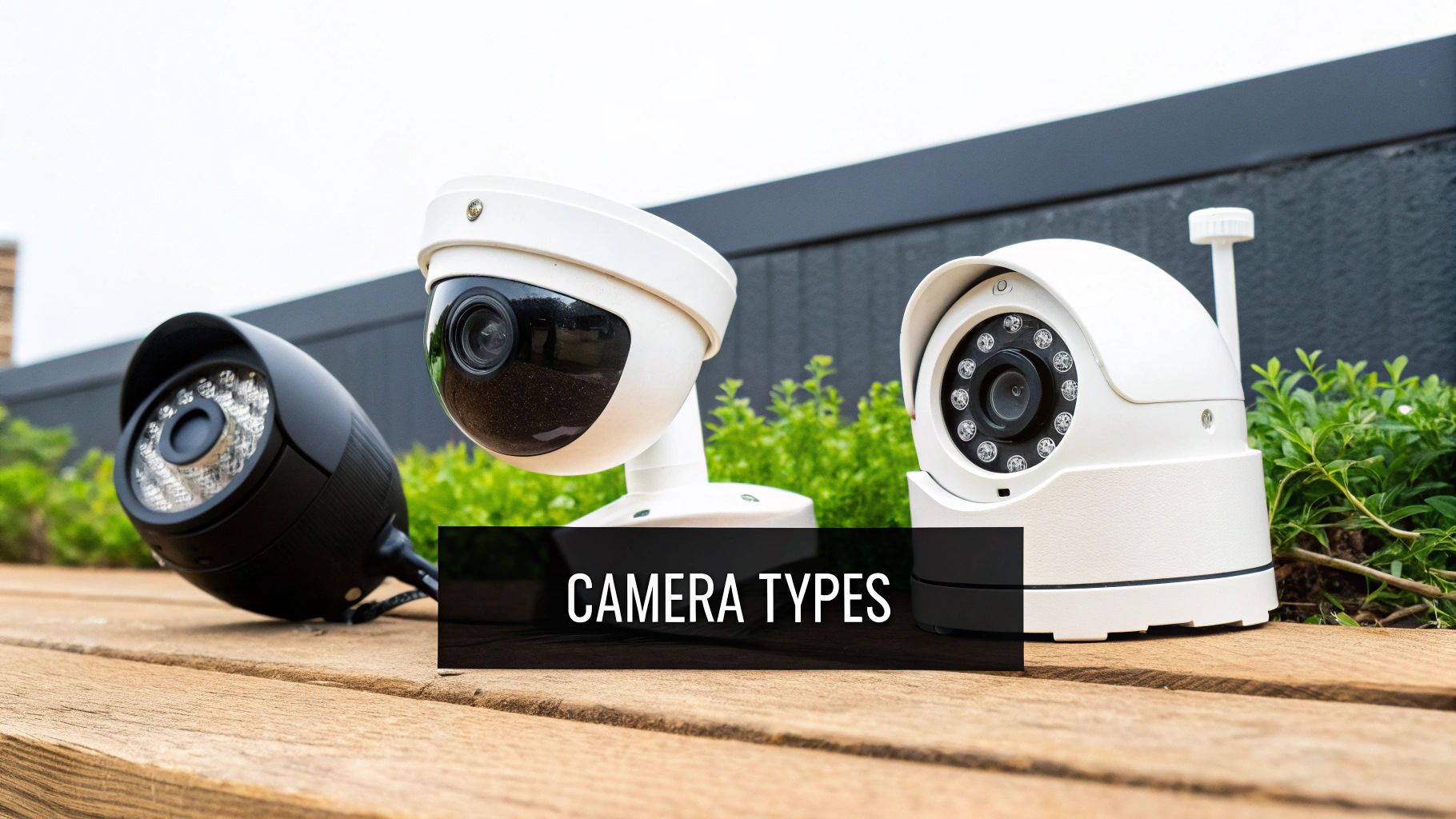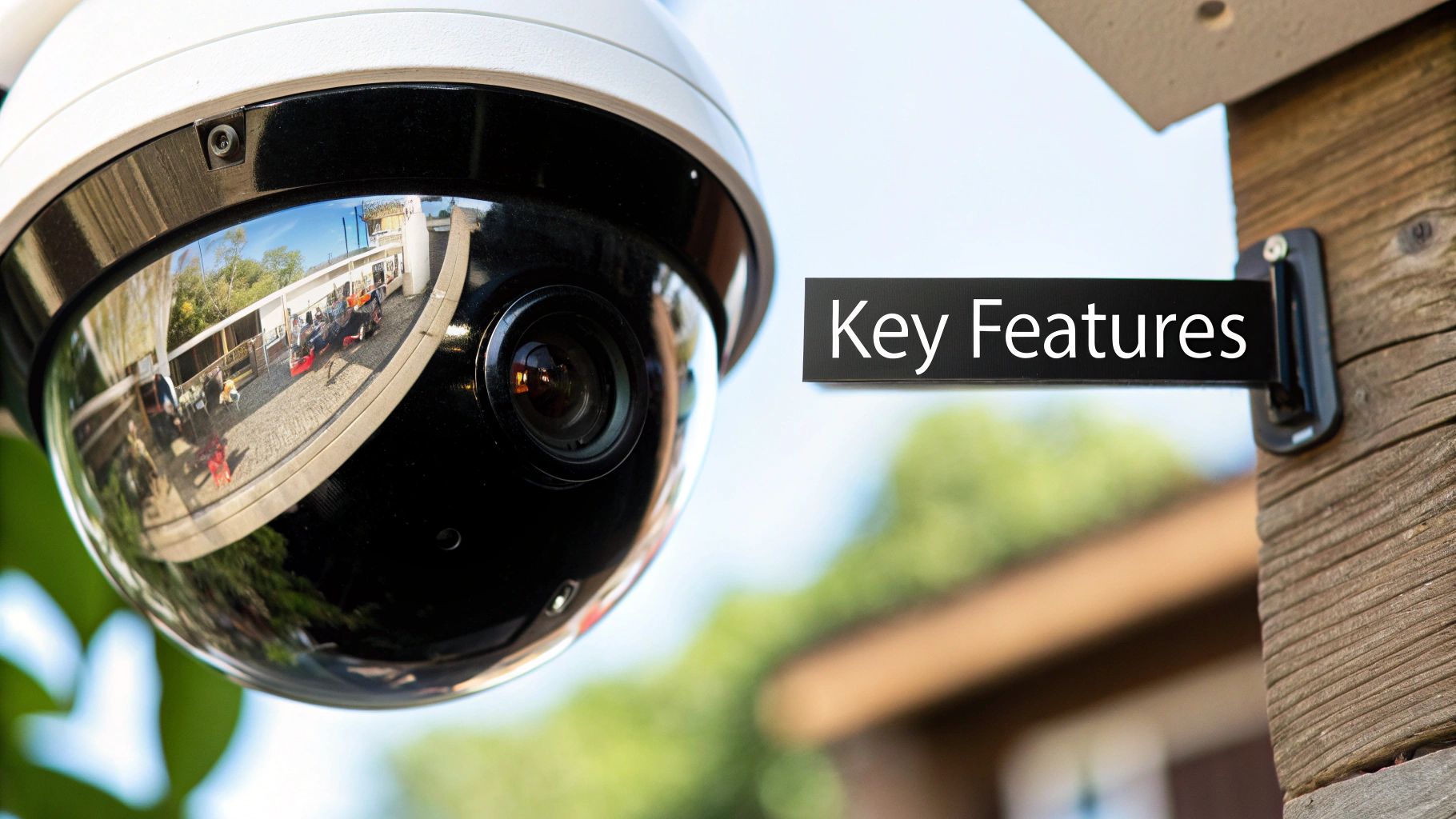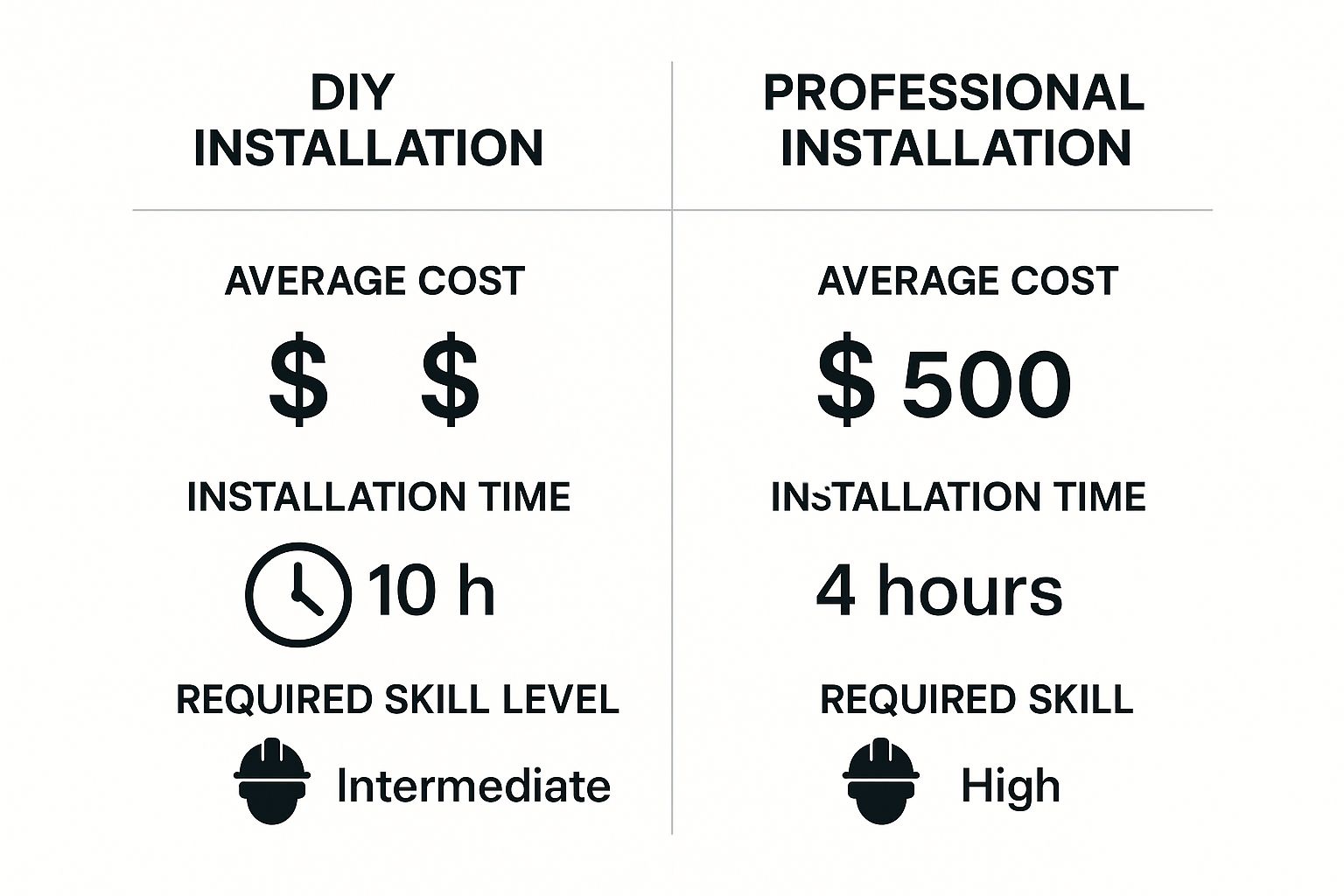Your Guide to Security Camera Systems in NZ
A modern security camera system is so much more than a box that just records video. Think of it as an intelligent, connected network built for proactive protection. It gives Kiwi homeowners and businesses powerful tools for genuine peace of mind, all accessible right from a smartphone, using legal communication devices commonly available in New Zealand.
Why Modern Security Cameras Are More Than Just Recorders
Gone are the days of grainy, unreliable CCTV footage that was only useful after a break-in. Today’s security camera systems have evolved dramatically, becoming smart, user-friendly networks that act as a vigilant partner in safeguarding what matters most.
It’s a bit like the difference between an old landline phone and the smartphone in your pocket. Both can make calls, sure, but the smartphone opens up a world of integrated features—from maps and messaging to high-definition video—that make it an indispensable tool. A modern security camera system has made a similar leap, integrating advanced capabilities that transform it from a passive recorder into an active guardian.
The Shift to Proactive Protection
The biggest change is the move from reactive to proactive security. Instead of just reviewing footage to see who broke in, a modern system is designed to prevent incidents from happening in the first place or to alert you the moment something is wrong. This is all thanks to a combination of key advancements now widely available across New Zealand.
For a system to be considered truly 'modern', it needs to deliver on a few key promises. When we look at what sets today's technology apart, it really comes down to a handful of essential features that have become the new standard for both homes and businesses in NZ.
To give you a clearer picture, here’s a quick rundown of the capabilities that define a modern security camera setup in New Zealand.
Key Features of Modern Security Camera Systems
| Feature | Benefit for NZ Users |
|---|---|
| High-Definition Clarity | Crystal-clear video in 1080p or 4K means you can identify crucial details like faces or number plates, which is essential for evidence. |
| Instant Remote Access | Securely view live or recorded footage from your phone, tablet, or computer anywhere in the world. Check on your property from anywhere. |
| AI-Powered Alerts | Smart technology can distinguish between a person, a vehicle, and a stray cat, drastically reducing false alarms and ensuring you only get notified of genuine events. |
| Two-Way Audio | Speak directly through the camera to greet a courier, instruct a visitor, or warn off a potential intruder. This is a key legal communication feature. |
| Night Vision | Advanced infrared (IR) or full-colour night vision technology ensures your property is monitored clearly, even in complete darkness. |
These features working together are what deliver that shift to proactive security we talked about. It's about having the tools to act in the moment, not just after the fact.
This evolution has made advanced security a practical reality for everyday Kiwis. Security cameras are now a critical part of home and business security systems across New Zealand, with demand driven by both safety concerns and the appeal of new technology. This growth is also fuelled by integrated smart home ecosystems that let you remotely monitor your property with incredible detail. For those interested in the market trends, this Grand View Research report offers a deeper dive into the industry dynamics.
Understanding Your Security System's Core Components

To build the right security camera system, you first need to get familiar with its building blocks. It helps to think of it like the human body's senses all working together. The cameras are the 'eyes', the cables or Wi-Fi are the 'nerves' sending signals back, and the recorder is the 'brain' that processes and stores everything it sees.
Each part has a distinct and crucial role. Understanding how they all function is what empowers you to pick the right gear that actually suits your property's needs. Let's break down these core components, focusing on the options you'll typically find as a home or business owner in New Zealand.
The Eyes of the System: The Cameras
The most obvious part of any setup is the camera itself. Different camera designs are built for specific jobs and environments, so choosing the right type is absolutely vital for getting effective coverage.
- Bullet Cameras: These are the ones you can't miss. Shaped like a rifle bullet, they are a fantastic visual deterrent. They’re ideal for monitoring long, narrow spaces like driveways, fence lines, or the side of a building, especially outdoors where their weather-resistant casings offer great protection.
- Dome Cameras: With their discreet, dome-shaped housing, these cameras are much less obtrusive than bullet models. They're perfect for wide indoor areas like a retail shop floor or an office, but also work well outdoors under eaves. A big plus is that their design makes it hard for anyone to tell exactly where the lens is pointing.
- PTZ (Pan-Tilt-Zoom) Cameras: These are the heavy hitters. PTZ cameras give you remote control to pan across a huge area, tilt up and down, and zoom right in on specific details. A single PTZ can often do the job of several fixed cameras, making it a powerful tool for actively watching over large sites like a construction yard or a marina.
A key takeaway for Kiwis is that a mix of camera types often gives you the best result. You might put a very visible bullet camera at your front gate to deter trespassers, a discreet dome to monitor your main entrance, and a PTZ to keep an eye on a large rural property.
The Brain of the System: The Recorder
The recorder is the central hub where all your video footage is processed, stored, and managed. The two main types you'll come across in New Zealand are Network Video Recorders (NVRs) and Digital Video Recorders (DVRs), and the difference between them is significant.
NVRs are the modern standard. They work with IP (Internet Protocol) cameras, which are smart enough to process video data right inside the camera before sending it to the recorder. The result? Much higher-quality digital footage. DVRs, on the other hand, are the older tech. They pair with analogue cameras and have to do all the video processing at the recorder, which often limits the resolution and features.
Honestly, for any new security camera system being installed in NZ today, an NVR is the standard. It's the only way to support the high-resolution, feature-rich cameras that provide the clear, actionable evidence property owners really need. This bit of foundational knowledge is your first step toward confidently discussing what you need with a supplier.
Navigating Security Camera Laws in New Zealand

Putting in a security camera system is a brilliant move for protecting your property. But here in New Zealand, that decision comes with clear responsibilities. The use of any surveillance cameras is guided by the Privacy Act 2020, which strikes a balance between your need for security and everyone else’s right to privacy.
Getting your head around these obligations isn't just about ticking legal boxes; it’s about being a good neighbour and operating your communication devices ethically. The core idea is pretty straightforward: you need a legitimate reason to be recording, and you have to do it in a way that’s fair and not overly intrusive.
Respecting Privacy with Camera Placement
One of the first questions we always get from Kiwi property owners is, "Where can I actually point my cameras?" The good news is you are well within your rights to monitor your own property. The catch is that you must take reasonable steps to avoid looking into private areas where people have a fair expectation of privacy.
For example, a camera aimed at your own front door and driveway is perfectly fine. But if you angle that same camera to peer directly into your neighbour's living room or over their fence into the back garden, you’re almost certainly crossing a legal and ethical line.
It all comes down to intention. Your system is there to secure your place, not to keep tabs on the private lives of others. Filming a public area like the footpath or road in front of your home is generally okay if it’s an unavoidable part of monitoring your entrance, but it shouldn't be the main focus.
The Importance of Notification and Audio Recording Laws
Another key part of the law in NZ is being upfront about recording. You must let people know they’re on camera, especially if you’re a business. For commercial properties, this is non-negotiable and is usually as simple as putting up a sign.
- Signage is Key: Placing signs at entrances that clearly state "CCTV in Operation" or "Surveillance Cameras in Use" is the best way to fulfil your legal obligations.
- Residential Use: For a home security camera system, signs aren't always legally required, but they are strongly recommended. A simple sign not only acts as a great deterrent but also shows you're being open and responsible.
New Zealand law is particularly strict about audio recording. Under the Crimes Act 1961, it is generally illegal to record private conversations that you are not a party to. Because of this, most security cameras sold in NZ have audio recording disabled by default, or the feature is not included at all. Your safest bet is to focus purely on video surveillance to avoid legal issues.
To make sure you're completely compliant, it's a good idea to dig into the specifics. You can learn more about CCTV privacy obligations in New Zealand to get a full picture. Using your system the right way ensures it remains a powerful asset for your security, not a legal headache.
Right, let's talk about one of the biggest decisions you'll make when setting up a security camera system: should you go wired or wireless? It's a fundamental choice, and here in New Zealand, it usually boils down to two main options. You can either run physical cables for a wired system or lean on your Wi-Fi network for a wireless one.
Each path has its own set of pros and cons, and the best fit really depends on your property, your budget, and what you’re trying to protect.
Wired vs. Wireless: The Core Difference
Wired systems, especially the ones using Power over Ethernet (PoE), are the undisputed champions of reliability. Think of them as the bedrock of professional security. Each camera is physically tethered to your recorder with a single cable that handles both power and data. The result? An incredibly stable, secure connection that isn't at the mercy of a dodgy Wi-Fi signal. This makes them the go-to for businesses or larger rural properties where a crystal-clear, uninterrupted video feed is non-negotiable.
On the flip side, you’ve got wireless systems, and their big selling point is flexibility. These cameras connect to your network over Wi-Fi, which means you don't have to drill holes and snake cables through your walls. It’s a brilliant solution for renters who can't make permanent changes, or for anyone in a smaller home who just wants a straightforward, easy-to-install setup.
Making the Right Choice for Your Situation
So, which one is for you? It really comes down to your specific needs.
If you own a retail shop in Auckland, a wired PoE system is almost certainly the way to go. You need that guaranteed, 24/7 coverage on your stockroom and shop floor without a single glitch. But if you’re a family renting a townhouse in Wellington, a wireless system you can set up in an afternoon and pack up when you move is a much smarter choice.
At its heart, the decision is a trade-off between rock-solid reliability and pure convenience. Wired systems are the ‘set and forget’ workhorses that just keep performing, day in and day out. Wireless systems give you the freedom to place cameras almost anywhere you have a power socket and a decent Wi-Fi signal.
Of course, these days, many setups—both wired and wireless—connect to the cloud. This gives you secure, off-site storage for your footage and lets you check in from your smartphone. It’s a feature most Kiwis have come to expect, and it adds another layer of security and convenience.
Choosing between a DIY installation and hiring a professional also comes with its own set of considerations, from cost to the time and skill involved.

As you can see, taking the DIY route can definitely save you some money upfront, but it requires a bit more technical confidence and a willingness to spend your weekend on a ladder.
Wired vs Wireless: A New Zealand Perspective
To make things even clearer, let's put these two systems head-to-head. This table breaks down the key differences to help you figure out which system makes the most sense for your home or business here in NZ.
| Aspect | Wired (IP PoE) System | Wireless (Wi-Fi) System |
|---|---|---|
| Reliability | Extremely high. A hardwired connection is immune to Wi-Fi dropouts or network lag, giving you a consistently stable video stream. | Good, but depends. Performance is completely tied to the strength and stability of your Wi-Fi signal. |
| Installation | More involved. This requires running Ethernet cables through walls and ceilings. For a clean, professional finish, it’s often best to call in an expert. | Simple. You can often get it up and running in under an hour. It's perfect for DIY projects since there’s no major cabling needed. |
| Best For | Businesses, large homes, rural properties, or any site where security is absolutely critical and reliability is the number one priority. | Renters, apartments, smaller homes, or any situation where running cables is either impractical or not allowed. |
Ultimately, there's no single "best" system—only the best system for you. By weighing up the reliability of a wired setup against the sheer convenience of a wireless one, you'll be able to make a confident choice that keeps your property safe and secure.
Advanced Features That Power Modern Surveillance
Today's security cameras are a world away from the grainy, passive recorders of the past. Modern systems are packed with smart technology that transforms them from simple observers into active guardians for your property. These advanced features, once the domain of high-security installations, are now widely available for homes and businesses across New Zealand, offering a new level of proactive protection.
The real game-changer here is AI-powered analytics. This isn't just a buzzword; it's intelligent software that can actually distinguish between a person, a vehicle, and the neighbour's cat wandering across your lawn. This intelligence is crucial because it dramatically cuts down on the false alarms that plagued older motion-detection systems, meaning you only get alerts that genuinely matter.
Seeing is Believing with Enhanced Video Quality
When it comes to security footage, clarity is everything. Two features, in particular, make all the difference.
- 4K Resolution: This ultra-high definition gives you four times the detail of standard 1080p. What does that mean in the real world? It means you can digitally zoom in on recorded video to see crucial details, like a face or a number plate, without the image dissolving into a blurry, pixelated mess. If you ever need to provide evidence, this level of detail is invaluable.
- Colour Night Vision: Traditional infrared (IR) night vision gets the job done, but it gives you a black-and-white image that lacks important detail. Colour night vision is a massive leap forward, using highly sensitive sensors and any available ambient light to produce a full-colour picture, even after dark. This makes it far easier to identify things like the colour of a car or a person's clothing, completely changing the game for nighttime monitoring.
Another powerful tool is the ability to interact with your environment from anywhere. Many of the latest systems feature two-way audio, a legal communication device that lets you speak directly through the camera's built-in speaker. You can guide a courier, greet a visitor, or even deliver a loud, firm warning to deter a potential intruder, all in real time.
This is the same grade of technology used to protect our nation's most critical infrastructure. The New Zealand Data Center Physical Security Market is growing precisely because of the need for robust protection that relies on advanced video hardware and AI analytics. You can learn more about the physical security of NZ data centres to see how this tech is applied at the highest levels.
These advanced systems naturally connect to your home or business network. For anyone wanting to ensure their surveillance data is kept completely secure, looking into enterprise network security solutions is a smart move to safeguard your entire digital setup.
When you combine these features, you create a truly formidable security presence, especially for outdoor areas. For more specific advice on this, you might find our guide on choosing an outdoor security camera helpful.
How to Choose the Right Security Camera System

With so many different features and types of cameras on the market, picking the right security camera system can feel like a huge task. Let’s cut through the noise. This is where we pull everything together into a practical plan to help you choose a setup that actually fits your needs, wherever you are in New Zealand.
The whole process really boils down to answering a few straightforward questions first. If you don't know what you're trying to achieve, you'll end up with a system that doesn't quite do the job.
Start With Your Core Objectives
Before you even glance at a single camera, take a moment to figure out what you truly want your system to do. Ask yourself these key questions:
- What’s my main goal here? Are you trying to scare off potential trespassers before they even try something? Or is your priority to capture crystal-clear evidence if an incident happens? Maybe you just want the peace of mind that comes with checking in on your property from your phone.
- What are the absolute must-cover spots? Pinpoint the critical zones that need surveillance, no exceptions. Think main entryways, a vulnerable side of the building, or a stockroom holding valuable goods.
- What’s my budget? Be realistic about what you can spend. Remember to factor in not just the gear itself, but any costs for professional installation.
Getting clear answers here gives you a solid framework for your search. After all, a system designed to deter thieves on a rural Waikato farm will look very different from one built to capture fine details in a busy Auckland retail store.
Your goal directly shapes the technology you need. For pure deterrence, big, obvious bullet cameras and clear warning signs work wonders. For evidence, you'll want to prioritise things like 4K resolution and colour night vision. And for remote monitoring, a top-notch mobile app with instant alerts is non-negotiable.
Building Your Ideal System
Once you’ve got your objectives locked in, it's time to match them to specific features and components. This is the fun part, where you connect your ‘why’ with the ‘what’.
Think about the unique challenges of your location. A coastal property in the Bay of Plenty, for instance, needs cameras with tough, weather-resistant casings to handle the salt spray and humidity. On the other hand, a business handling cash or high-value stock should lean towards a wired PoE system for its rock-solid reliability.
This planning stage is what stops you from wasting money on the wrong gear. To get a much deeper dive into all the components and options out there, check out our comprehensive guide on security cameras systems. Follow this structured approach, and you'll be in a great position to pick a solution that gives you effective, long-term protection for your home or business.
A Few Final Questions
As you get closer to choosing the right security camera system, a few practical questions usually pop up. Let's tackle the most common ones we hear from Kiwis to help you wrap things up with confidence.
Do I Need a Professional to Install My System?
That really depends on the system you choose. Many of the newer wireless cameras are genuinely easy to set up yourself. If you're comfortable placing a camera on a shelf and connecting it to your Wi-Fi, you could be up and running in under an hour.
But if you're looking at a more robust wired (IP PoE) system, especially for a larger home or a business, getting a professional in is almost always the right call. A pro installer knows exactly where to place cameras to eliminate blind spots, how to run cables discreetly, and will ensure everything is configured securely on your network. It's the best way to make sure your investment works flawlessly from day one.
How Much Video Storage Do I Really Need?
This comes down to a few things: how many cameras you have, the video quality you're recording in, and whether you're recording constantly or only when motion is detected.
For a typical Kiwi home with two to four HD cameras set to record only on motion, a 1-2TB recorder will easily hold several weeks of footage. On the other hand, a business that needs continuous, 24/7 recording will chew through storage much faster and need a significantly larger system. Most systems are smart enough to automatically overwrite the oldest footage once the hard drive is full, so you don't have to manage it yourself.
As a general guide for most homes and small businesses, aiming for at least 14-30 days of stored video is a great starting point. This gives you plenty of time to review any incidents without rushing.
Can I View My Cameras When I’m Away?
Absolutely. Remote viewing isn't just a bonus feature anymore—it's a standard, essential part of any modern security system you'd buy today.
Whether it’s a wired or wireless setup, your system connects to your internet router. This simple connection is what lets you tap into live video feeds or look back at recorded clips from literally anywhere in the world. All you need is the system's secure smartphone app or a web browser on your computer. It's perfect for checking in on the house while you're on holiday or keeping an eye on your business after hours.
Ready to secure your property with a reliable communication and surveillance solution? The team at Mobile Systems Limited are New Zealand's specialists in designing and installing custom systems for the toughest conditions. Explore our tailored solutions today.


